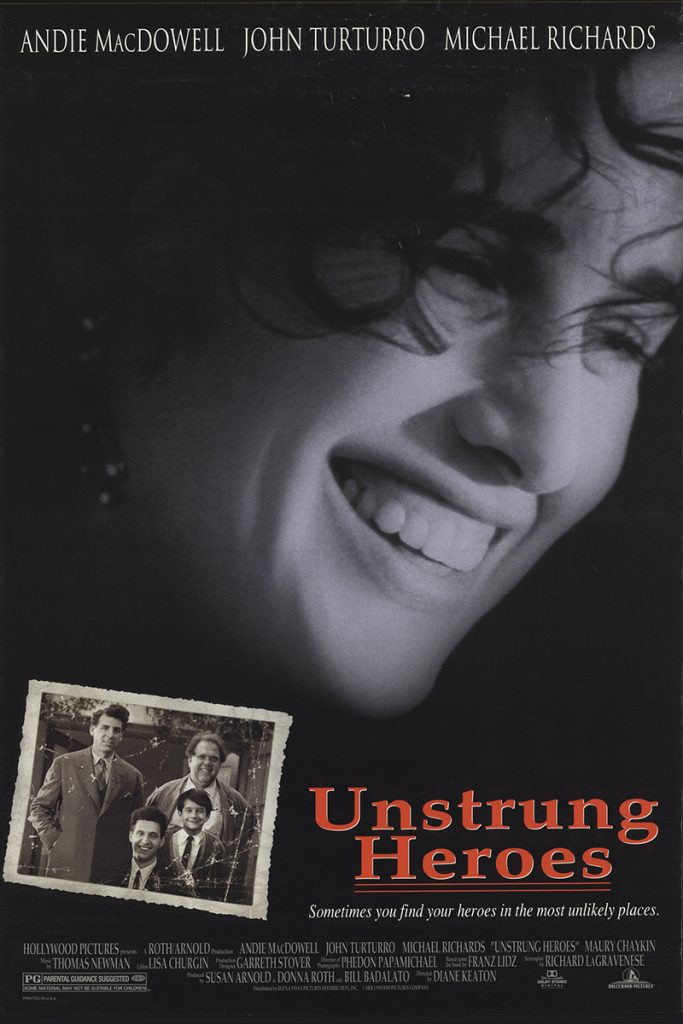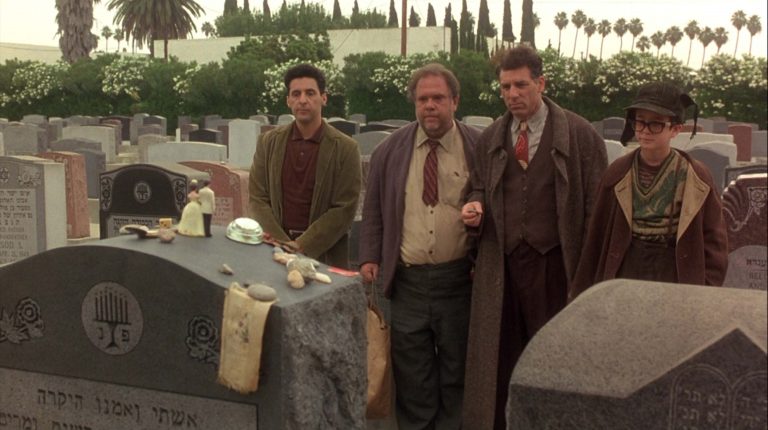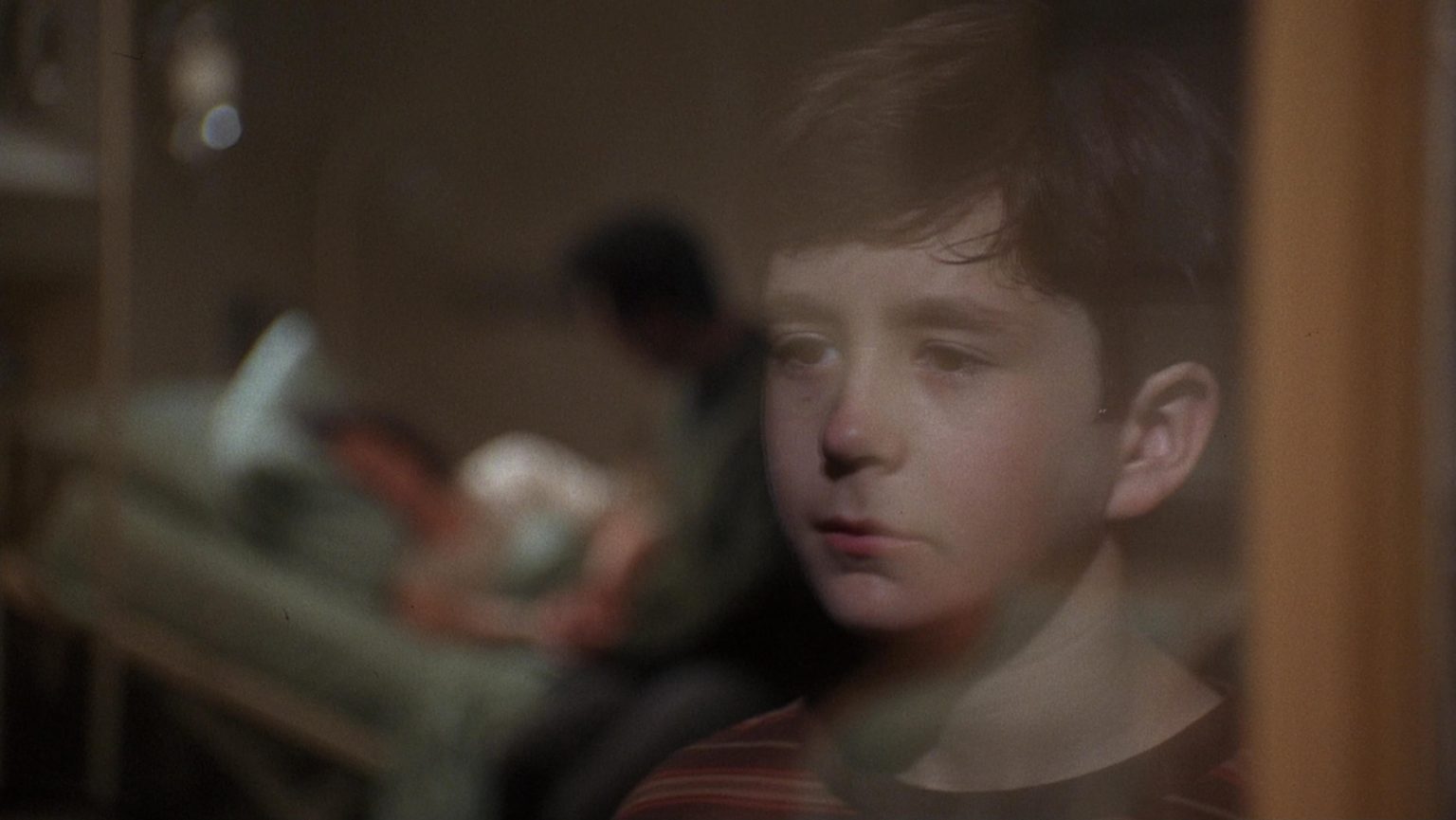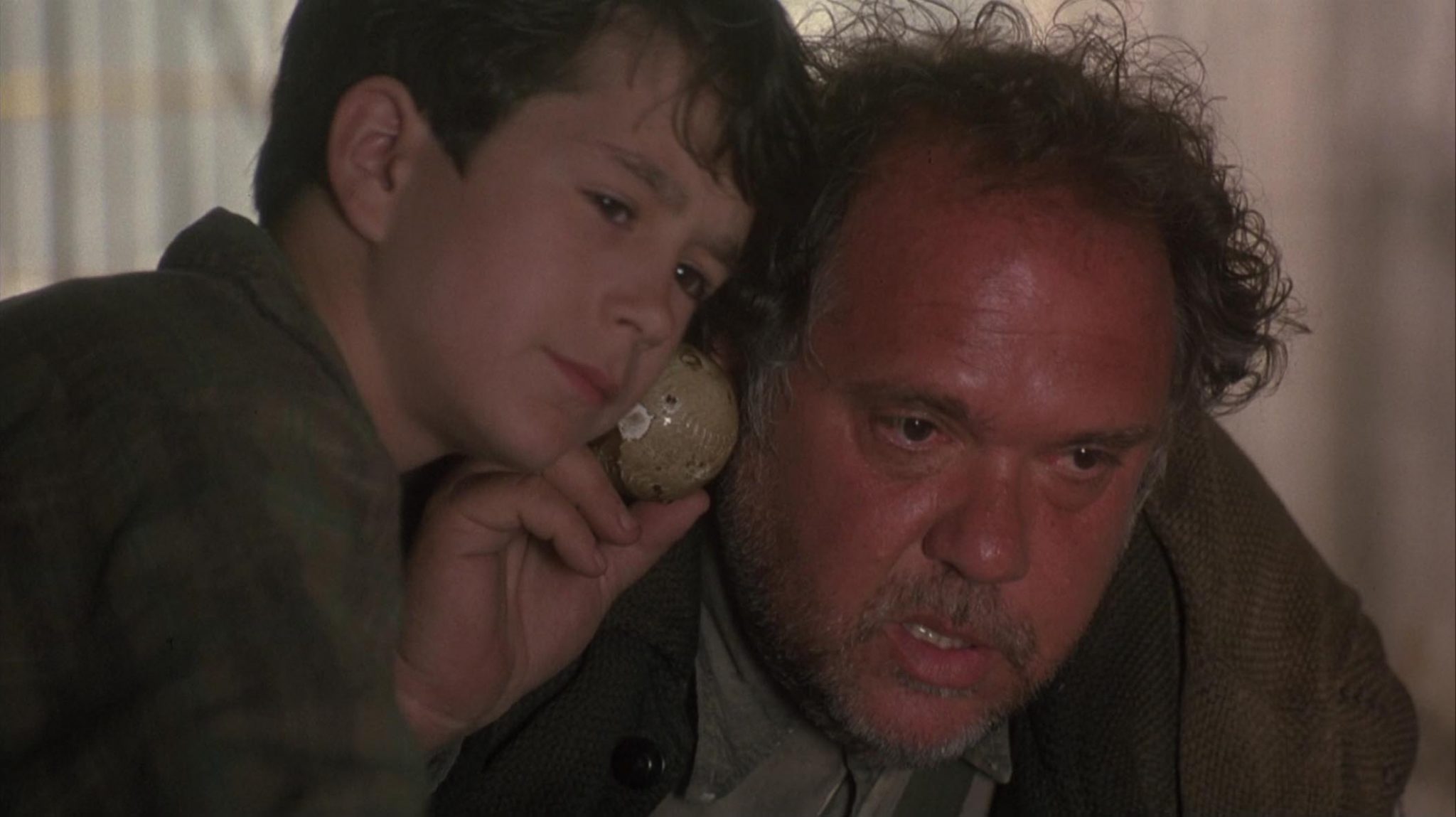Starring: Andie MacDowell. John Turturro, Michael Richards, Maury Chaykin and Nathan Watt
Written by: Richard LaGravenese
Base on the Novel by: Franz Lidz
Directed by: Diane Keaton
Rated: PG
Running Time: 1hr 33mins
NOMINEE – ACADEMY AWARDS: Best Music, Original Musical or Comedy Score (Thomas Newman)
NOMINEE – GRAMMYS: Best Instrumental Composition Written for a Motion Picture or for Television (Thomas Newman)
NOMINEE – AMERICAN COMEDY AWARDS: Funniest Supporting Actor in a Motion Picture (Michael Richards)
Steven Lidz: “It was mom who told me a hero is anybody who finds his own way through this life.”

There is a scene about an hour into UNSTRUNG HEROES that encompasses everything right with the film. The hero, Steven Lidz, a twelve-year-old boy, is on his way to the cemetery to visit his grandmother on her birthday. He is with his father, Sid, and two uncles, Danny and Arthur. Sid and his two brothers have a very different outlook on life, which has always caused a lot of tension between them and on the way to the cemetery they find themselves arguing about something rather trivial, the speed of a record album that Arthur has brought to leave by their mother’s grave as a gift. The viewer gets a real sense of how these characters relate and although they’re in the midst of an argument, it’s all rather humorous and starts what could turn out to be a depressing trip off on a light-hearted note. Of course, when they arrive at the gravesite things take a serious turn as the brothers look somberly upon their mother’s grave before abiding by the Jewish tradition of placing a rock on the deceased’s stone as an act of remembrance and respect. Arthur, the more emotional of the three brothers, lays some gifts by the gravestone. It’s all very bittersweet and brings an honest sincerity to a scene that began in such an offbeat way. Throughout the rest of the scene, we get some more bickering from the brothers regarding whether or not they should change young Steven’s name to Franz and it all becomes rather humorous again. This scene, in a story that is ultimately about a family dealing with a loved one dying from an incurable disease, could have very easily been played for tears. Instead, director Diane Keaton takes a more lighthearted approach to it which is very reflective of the movie as a whole. The film tackles some very serious issues while giving the viewer the perfect balance of humor to offset the sentimental emotions that resonate throughout. It’s ultimately a tragic story that is effectively moving without giving us too depressing a moviegoing experience.

Based on the autobiographical novel by Franz Lidz, the film tells the story of a young boy, Steven, growing up in 1962. His whole family is shown in the opening scenes as being very close and happy. Steven is at that point in his life when he is beginning to discover who he is and it’s his mom, Selma (Andie Macdowell), who tells him that this will be the year he will find his path in life. In fact, it is Steven’s mother who seems to be the glue that keeps the family grounded in the real world as Sid, with his love of science and his need to document everything, seems to have his head in the clouds with his experiments. So, it’s only natural that in a story of this kind, it would be the glue that would be stricken down and that is exactly what happens when it is discovered that Selma has an incurable disease. Sid, at first, tries to keep the reality of the situation from his kids, but when it eventually comes to light Steven is crushed and being unable to deal with it emotionally runs away to stay with his two uncles who are a little (okay a lot) on the eccentric side. Through his quirky but very real interactions with his uncles, Steven begins to learn how to navigate his own way through life which, unfortunately, takes him down a very different path than his dad would like.

The central character, Steven, is played by a relatively unknown young actor, Nathan Watt. Watt effectively brings a genuine innocence to the part while navigating through the constantly changing emotions that Steven experiences on his journey of self-discovery. As a young actor, Watt draws us into the quirky moments of Steven’s life while also bringing some heartbreaking emotion to the scenes where he must deal with accepting his mom’s impending situation. Under Keaton’s incredible direction, Watt truly feels like a natural as Steven never comes off as either flat or over the top and every emotional beat feels grounded in a subtle reality, making it easy for the viewer to want to route for him as he makes his way though this particular moment in life.
Andie MacDowell (SEX, LIES AND VIDEOTAPES, GROUNDHOG DAY) gives one of the best performances of her career as Steven’s mom, Selma. Selma’s sickness is ultimately the catalyst for everything that happens and MacDowell’s performance is extremely effective because she never overplays the situation to manipulate the viewer’s heartstrings. Instead, it is a more subtle performance that keeps the sick, dying character from overtaking and dominating a movie that’s really not about her.

Playing Steven’s dad is John Turturro (BARTON FINK, THE BIG LEBOWSKI), an underrated actor who seems to always deliver a great performance. Here he brings a certain desperation to the role of Sid and although it’s Selma’s sickness that may drive the story forward, it’s actually Sid’s relationship with Steven that is the root of a lot of the emotion in the film. Sid is someone that believes strongly in the purity and power of science and we find out during Steven’s opening narration that Sid believes, “There is nothing broken that science couldn’t fix.” As he tells Steven about a trip to the Worlds fair you can feel how much the possibilities of science in the future means to him. So, when it begins to become apparent that science isn’t going to be good enough to save the love of his life, it doesn’t make sense to him and he begins to unravel emotionally. Then, watching his brother’s influence on Steven’s newfound direction in life breaks him down even more as he begins to believe that he is not only losing his wife but in a very different way he may be losing his son as well.
Most of the film’s quirkiness is brought on by Michael Richards and Maury Chaykin who play Steven’s very eccentric uncles. They are two men who are the perfect compliments to each other. Danny is paranoid and everywhere he looks he sees conspiracy theories. He tells Steven that there are only 8 honest people in the world (There used to be 12, but 4 were assassinated). When young Steven tells his mom that he made pancakes for his uncles, he says, “Arthur ate 25 of them and Uncle Danny did too, though he thought they were bugged.” Richards plays Danny to perfection, but let’s face it, he’d been practicing this part for years as he’s definitely channeling his inner Kramer from SEINFELD. Fortunately, the character with a few calculated adjustments fits so comfortably into the film’s overall tone that it never feels as if Richards is just playing a rehash of an old part. On the other hand, we also have Arthur who is Danny’s polar opposite. Arthur is someone who has his own quirks but they are much more subtle as he is more of a sentimentalist. Where Danny sees conspiracy in his surroundings, it is Arthur who chooses to find the good in things. He is a hoarder of sorts who collects things he finds in abandoned houses and warehouses and in one of my favorite scenes Arthur is collecting balls from a sewer and he tells Steven, “You know how seashells hold the sound of the ocean? I think that balls hold the sounds of the children that bounced them.” Their apartment is overstuffed with all sorts of used newspapers and various tchotchkes and we are given the impression that Arthur is not needlessly collecting these items but instead feels like he is saving them from a fate of rotting away somewhere. Arthur is slightly slower mentally, but we grow to love him because Chaykin portrays him as genuinely warm and caring. It’s Arthur who teaches Steven to save things as memories of the important moments in life, memories that you don’t want to disappear and might have some inner meaning to you.

UNSTRUNG HEROES is a bittersweet tale that works better than most because it never gets over-sentimental. It lays its heart on its sleeve but does so in a very subtle way. The film is an effective exercise in balance. Through its use of humor, the film is able to deal with its themes of tragedy and heartbreak without it becoming too depressing a viewing experience. It is a sometimes funny and sometimes sad experience that ultimately works because it’s not afraid to rely on its honest emotions.
Watch UNSTRUNG HEROES
You May Also Like
